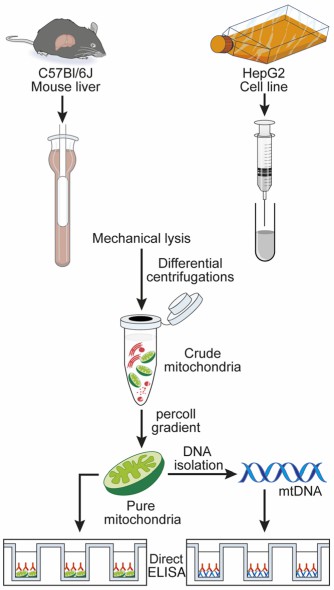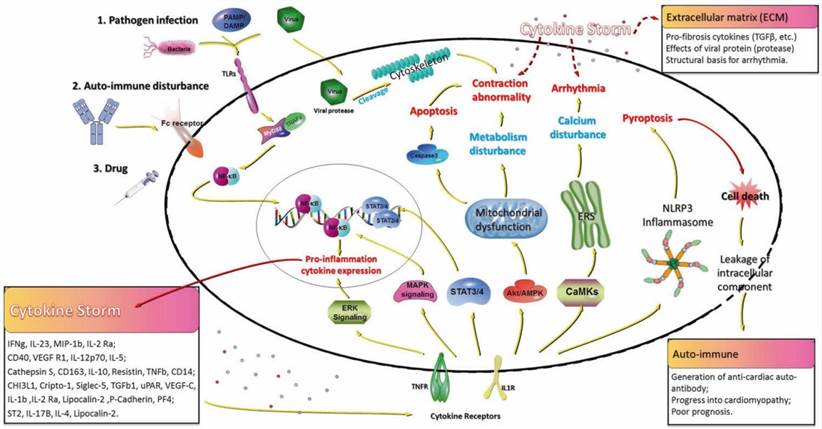NAA Services for Anti-Mitochondrial Antibody (AMA)
Creative Biolabs has extensive experience in natural autoantibodies (NAA) research and can provide a full range of anti-mitochondrial antibody (AMA) marker services for our worldwide customers with the highest quality and most competitive price for global clients.
Background of Anti-mitochondrial Antibody
Anti-mitochondrial antibodies (AMAs) are autoantibodies formed against mitochondria which are important energy sources inside the cells. Actually, AMAs are immunoglobulins that directly against antigenic components of the cellular mitochondria in different human organs and tissues and cause pathological processes. The first identification of AMA dated back to 1958 that isolated from patients affected by primary biliary cirrhosis by indirect immunofluorescence. Besides primary biliary cirrhosis, AMAs in the blood or serum are considered to be indicative of the presence of a number of conditions, such as sjögren's syndrome, autoimmune hepatitis, syphilis, etc.
 Fig.1 The antigen preparation and detection of AMA.1
Fig.1 The antigen preparation and detection of AMA.1
The Role of Anti-mitochondrial Antibody (AMA) in Sjögren's Syndrome (SS)
Sjögren's syndrome (SS) is a chronic systemic autoimmune disorder characterized by lachrymal and salivary gland dysfunction presenting as dry mouth and dry eyes. SS is one of the most common autoimmune that mainly affecting elder females accompanying other immune system disorders, such as rheumatoid arthritis and systemic lupus erythematosus. Although the pathogenesis of SS still remains unclear, evidence showed that autoreactive lymphocytes and autoantibodies made a great contribution to this pathogenic process. Among these AMAs, the anti-mitochondrial M2 antibody has been reported that could be detected not completely specific in SS patients.
The Role of Anti-mitochondrial Antibody (AMA) in Malaria
Malaria is a mosquito-borne infectious disease caused by parasitic single-celled microorganisms and transmitted by the bite of infected mosquitoes. Once is infected, the parasites multiply in the host's liver before infecting and destroying red blood cells. At the early malaria infection, the parasites habitat in the host and can develop escape mechanisms to host immune system. The complete intracellular replication within hepatocytes of parasites can trigger inflammatory, immune response, even apoptosis. Researches demonstrated that as a hallmark of primary biliary cirrhosis, AMAs also participate in the liver stages of malaria.
The Role of Anti-mitochondrial Antibody (AMA) in Myocarditis
Myocarditis is an inflammation and damage of the heart muscle or myocardium characterized by symptoms as an abnormal heartbeat, breath, and chest pain. Myocarditis commonly results from viral infections, bacterial infections, autoimmune disorders, and toxins. Several circulating autoantibodies induced by infections have been demonstrated play a crucial role in the progression and induction of myocarditis. Moreover, mitochondrial function is remarkably significant to energy homeostasis, metabolism, signaling, and apoptosis in human cells particularly cardiac cell due to that cardiac contractility is strongly dependent on the mitochondria. Among the AMAs, anti-M7 AMA has been exclusively detected in sera from patients with acute and chronic myocarditis. It can be one of the potential diagnostic markers combing with other NAAs in Myocarditis.
 Fig.2 The role of auto-immune in fulminant myocarditis.2
Fig.2 The role of auto-immune in fulminant myocarditis.2
Based on our well-established NAA research platforms and Ph.D. level scientists, Creative Biolabs is able to provide NAA related products and custom services. Our NAA services can cover every step of your project, from NAA detection, NAA profiling, to NAA epitope mapping. Do not hesitate, just contact us for more information.
References:
- Becker, Yann, et al. "Anti-mitochondrial autoantibodies in systemic lupus erythematosus and their association with disease manifestations." Scientific reports 9.1 (2019): 4530.
- Hang, Weijian, et al. "Fulminant myocarditis: a comprehensive review from etiology to treatments and outcomes." Signal Transduction and Targeted Therapy 5.1 (2020): 287.
Related Services:
- NAA Services for Anti-Centromere Antibody (ACA)
- NAA Services for Anti-Muscarinic 3 Receptor (M3R) Antibody

